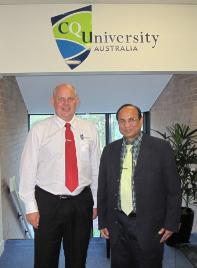VC of new Indian Uni in Rocky for talks on collaboration
Published on 01 December, 2011
The Vice-Chancellor of India's leading newly-opened Central University of Rajasthan (CURAJ) has visited CQUniversity Rockhampton Campus for talks exploring future collaboration between the two institutions.
Like Rockhampton, Rajasthan* has a dry, hot and arid climate but still manages to attract plenty of tourists, so there's a chance geographical similarities could create future opportunities. For example, it's likely there will be collaborative research on revegetation of disturbed sites, involving arid zones of Rajasthan.

Visitor Professor M. M. Salunkhe with CQUni's Professor Scott Bowman
Professor M. M. Salunkhe is a renowned organic chemist who served five years as Vice-Chancellor of Shivaji University in Maharashtra. He's now using his expertise to shape one of the Indian government's newly established central universities, having taken over the role of building the new institution from scratch in 2009. Students were initially recruited to a temporary campus site at Kishangarh but now a new campus is under construction on a greenfield site beside the highway, at Bander Sindri.
The distinguished visitor met with CQUniversity VC Professor Scott Bowman as well as faculty deans and the Director of the Institute of Resource Industries and Sustainability (IRIS). The visit was arranged with help from CQUniversity Associate Professor Nanjappa Ashwath, from the Centre for Plant and Water Science.
Professor Bowman and Professor Salunkhe discussed closer ties and joint efforts in relation to curriculum and study programs, teaching methods, student and staff exchanges, industry research and consultancy, and reciprocal recognition of awards.
The Central University of Rajasthan has a stated aim to establish academic collaborations for exchange of teachers, researchers, students and experts. Its overarching theme is 'sustainable development'.
Professor Salunkhe said CURAJ and CQUni had common interests across education research, management, sustainability, media studies, environmental science and biotechnology, which were worthy of consideration for collaboration.
He said specific areas for cooperation could include the sugar substitute plant stevia, waste water, phytoremediation (green capping of landfills), medicinal plants, plant biotechnology, biophysics, pollution, waste resource management and fresh water ecology, among others. There could also be collaboration across marketing, finance, organisational behaviour and HRM, as well as artificial intelligence, computer graphics, and algorithms.
* Rajasthan is India's largest state and is located in the north-west of the country.

